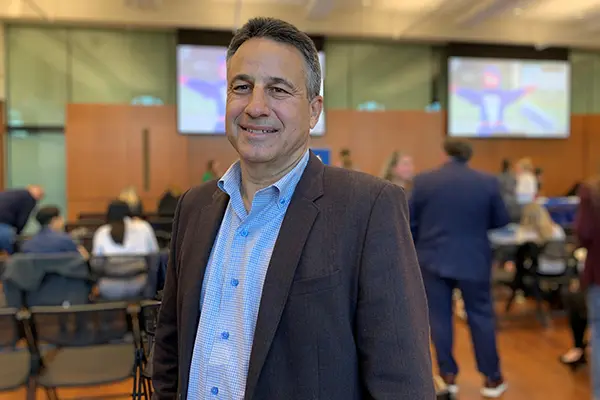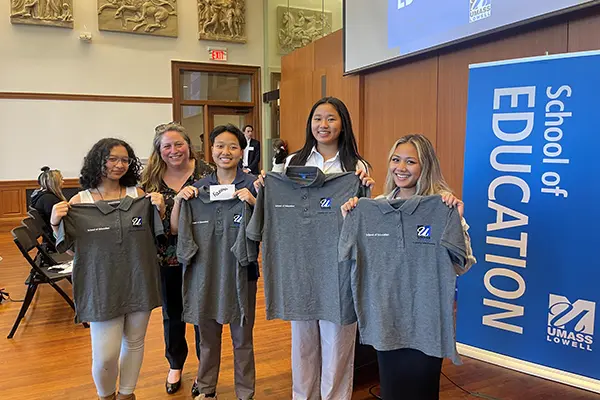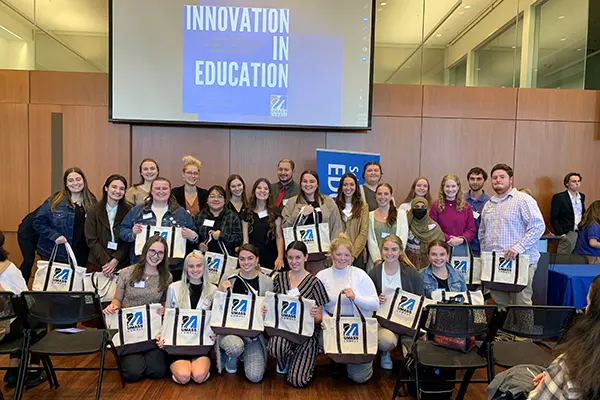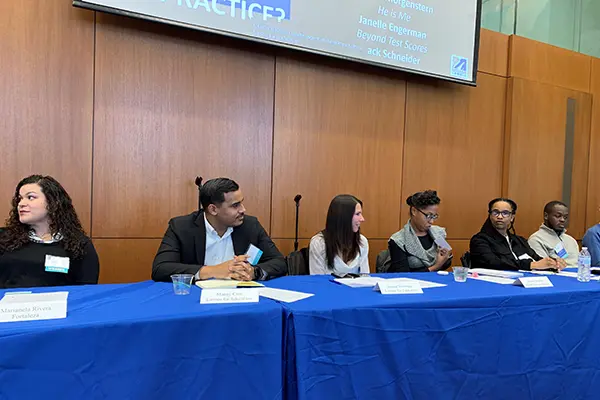Focus on Need for Teachers of Color
 Image by K. Webster
Image by K. Webster
10/26/2022
By Katharine Webster
“Aspiring teachers, you have – apart from parenting – the most important job in the world. Every other profession passes through you.”
That message from alumnus and keynote speaker Mark Elgart ’02, president and chief executive of the education nonprofit Cognia, resonated with dozens of future teachers who were celebrated at the start of the fall Education Symposium.
First up to receive the crowd’s applause and UML School of Education-branded polo shirts were four of 13 Lowell High School students who are taking Introduction to Teaching in the Inclusive Classroom at UML through a dual enrollment class. The next group was UML B.A.Ed. students in a different section of the same course.
Finally, a large group of senior UML education majors, all of whom are now student teaching, posed for a group photo and another round of applause and cheers.
“We have an urgent need for more teachers, especially teachers of color,” said Assoc. Prof. Jill Lohmeier, education faculty chair. “So we want to get local high school students thinking about careers in education.”
 Image by Cassandra McCallum
Image by Cassandra McCallum
The theme of the symposium was “radical innovation in education,” and all the speakers talked about the need to transform public education to better serve students of color, students with disabilities, students living in poverty and students whose home language is not English.
They spoke about the importance of encouraging more students of color to pursue careers in education to reduce the racial gap between students and teachers, because research shows that students of color who have even one teacher of color earn better grades and are more likely to graduate from high school.
In Massachusetts, students of color comprise 44% of K-12 students, while teachers of color make up less than 10% of educators, according to the state Department of Elementary and Secondary Education. The gap is even wider in the urban districts that serve the most students of color, says Assoc. Dean Stacy Szczesiul.
UMass Lowell is working with Lowell High School and other local school districts to get more students of color into the profession – and to mentor and sustain them once they’re teaching in their communities – by helping with teaching pathway programs like the one at Lowell High and with teacher mentoring circles.
“There are tremendous educational inequities in this country,” Elgart said. “Yet it only takes the magic of one teacher to change that.”
Elgart, a former math and physics teacher and middle school principal who earned his Doctor of Education degree at UML, went on to head Cognia, a nonprofit that works with 36,000 schools in 90 countries on educational improvement, accreditation, professional development and student assessment.
Cognia’s research shows that the most successful schools, no matter their economic resources, are the ones that engage students, give them a sense of belonging and instill them with confidence that they can reach their educational and professional goals, Elgart said.
 Image by K. Webster
Image by K. Webster
The schools that dealt successfully with the unprecedented disruptions caused by the COVID-19 pandemic were likewise those with a strong culture that adapted in a consistent and predictable way, whether they educated students online-only, in the classroom or using a hybrid model, he said.
“Work unraveled, family time unraveled, because everything revolves around school,” he said. “The schools that were able to persevere had a strong sense of community, had trust, and established a routine and stuck to it.”
Yet routine can also get in the way of innovation, he said, and innovation is more necessary than ever, given the growing educational gaps in the U.S. But initiatives such as a new curriculum won’t be successful if they are imposed from the top down, he said; innovations only become sustainable when teachers take ownership of them in a school with a culture of continuous improvement.
“Every public school in this country has a school improvement plan, but the majority are never executed,” he said.
Elgart’s remarks were followed by a panel discussion involving people working for local and regional nonprofits that are addressing disparities in student achievement, advocating for greater diversity in the teaching workforce or both, some of them in partnership with the School of Education.
Panelists represented Fortaleza, a new Hispanic and Latino advocacy group addressing disparities in student achievement in Lowell; Latinos for Education, which is promoting legislation that would require Massachusetts to focus more resources on districts with the biggest achievement gaps; Higher Ground Boston, which works with school districts and nonprofits to support homeless children; He is Me Institute, which recruits and supports Black men as teachers; the Lowell Education Justice Alliance; and Educators Rising, which encourages students in diverse communities to become teachers.
 Image by K. Webster
Image by K. Webster
Janelle Engerman, chief impact officer at He is Me Institute, said that Black men are the most underrepresented group in teaching, at 1.6% of K-12 teachers nationwide.
She said that while attending 10 different schools as a child, she felt empowered when she had many teachers of color, but at schools with mostly white teachers, “I lost my sense of self-efficacy.”
She went on to become a teacher and high school vice principal before joining He is Me.
“There are Black girls who attributed their interest in education and becoming teachers” to me, Engerman said. “But Black males had even less representation.”
Panelist Ralph Saint-Louis ’18, ’20, a biology teacher at Lowell High School, earned a B.S. in biology while minoring in STEM education through the UTeach program. He went on to earn a master’s degree in biology as well.
“I never had a teacher of color until I came to UMass Lowell,” he said.
At UML, two professors of color played critical roles in his success, he said: Education Assoc. Teaching Prof. Sumudu Lewis, director of UTeach, and Chemistry Assoc. Teaching Prof. Khalilah Reddie.
Named by Time magazine as one of the most innovative teachers of 2022, Saint-Louis now works at the local, district and state levels to pave the way for greater educational equity, linguistically and culturally inclusive practices and teacher training, and a greater focus on competency-based learning and assessments.




